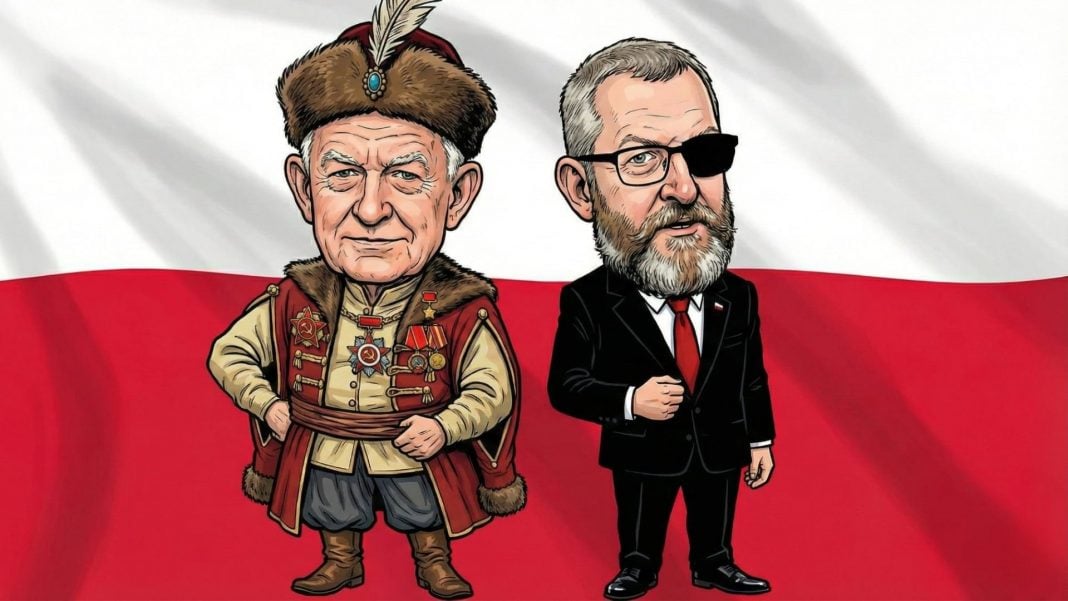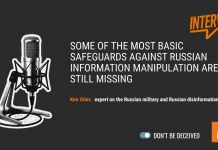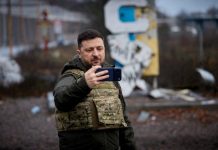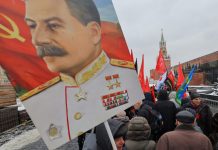Probably yes, because anyone can convert to Polishness.
Grzegorz Braun, leader of an extremely conservative and nationalist party, refers to Leszek Miller, a former communist activist [Editor’s note: Leszek Miller was a member of the Polish United Workers’ Party (PZPR), the communist party that ruled People’s Poland before 1989.] and post-communist Prime Minister of Poland – a potential ambassador for the Polish cause. The mountains are not parting, sulfur is not raining down on us – these words are not a harbinger of the end of the world. It would seem that almost everything divides them. However, the key word here is not “everything” but “almost.” “Almost” means something. It is as if this were happening according to a familiar script: stirring up emotions on the left and right. At the right moment, both margins will confront the center.
Grzegorz Braun was impressed by the extent to which Leszek Miller, on the issue of exhumations in Ukraine, “takes a Polish, national stance” and “the assertiveness with which he articulates Polish interests in this matter.” Of course, Miller’s sins in terms of sovereignty and “integration with the Eurokolkhoz” (a derogatory term for the European Union used by Eurosceptics) cannot be overlooked, but ultimately the leader of the Confederation of the Polish Crown speaks of a new hero: “with respect for the Prime Minister, here we can meet above other divisions.” .
So historical divisions are important, but they too are now part of history. At a time when we divided society along the lines of “who stood where ZOMO [editor’s note: the communist militia suppressing demonstrations] stood, who slept in the shipyard on Styrofoam,” the prime minister stood where ZOMO stood [as an activist of the PZPR, the ruling communist party – editor’s note]. Today, however, the dividing lines are different. The key to the current division is: “who wants Ukropol, who wants ukropolin [editor’s note: propaganda neologisms meaning Poland dominated by Ukrainian interests, suggesting betrayal of the homeland], who wants Banderland [editor’s note: reference to the Ukrainian national hero Stepan Bandera, who’s associated in Poland with crimes on Polish people in Volhynia during the II WW] on the Vistula,“ and Leszek Miller is on the ”good” side of this division. “Here we, Poles who want to remain Poles, can meet above the old divisions.”
Let’s stay with the interview with Braun. On the one hand, Braun quotes Zbigniew Herbert: “It is not in your power to forgive those who were betrayed at dawn,” but on the other hand, the MEP does not focus on these historical events. “The attitude towards the Kościuszko Uprising or the November Revolution does not really explain the phenomenon we are dealing with today,” he says. Were these the most important places of remembrance in our recent history? What about the murder of Home Army soldiers [soldiers of the independence underground], the shooting of workers, the beating of students? And what about Katyń? Wasn’t it around these issues that historical memory, cultivated especially on the right, was focused?
The leader of the Confederation of the Polish Crown assesses the likelihood of Leszek Miller being elected ambassador as very high, assuming, of course, that the citizens of the Republic of Poland would elect Braun as president. The ambassador would have to be uncompromising, and Leszek Miller has already earned trust in this regard. The former prime minister’s words regarding instruments of pressure on Kyiv were recalled: “The runway at the airport in Jasionka should be immediately sent for urgent inspection, maintenance, and repair, and Kyiv would immediately be inclined to engage in serious talks,” said Grzegorz Braun, paraphrasing Miller in the aforementioned interview.
Leszek Miller clearly stated his position on Polish-Ukrainian issues after Bronisław Komorowski’s infamous visit to Kiev in 2015. On the day of the Polish president’s visit to its building, after his speech, the Verkhovna Rada passed three laws on historical policy. The then president of the Democratic Left Alliance proved to be very active in his description (which was not without reason, but also lacked nuance). On Radio Jedynka, he said: “Komorowski went to Kiev to shake hands with the Ukrainians, and left with a knife in his back.” A decade later, Leszek Miller is the right wing’s favorite expert on detecting Ukrainian knives in Polish backs. They do not seem to reproach him for being a PZPR apparatchik [an activist of the communist Polish United Workers’ Party[, an SLD activist [leader of the post-communist Democratic Left Alliance after 1989], and no one mentions the connections of both now-historical parties with Russia. Anyway, Russia is not our problem. In this narrative, that country does not threaten us. We are threatened by 800+, Ukrainians using the Polish health service, Ukrainian ingratitude, inflated housing prices, and the Banderaization of Poland – under these blows, the Most Serene Republic trembles at its foundations.
Fortunately, the communist has become a patriot, because anyone can convert to Polishness.
[Interpretor’s note: Andrzej Kmicic is the protagonist of Henryk Sienkiewicz’s historical novel The Deluge, serving as a Polish cultural symbol of redemption and moral renewal. Initially a reckless traitor (who sided with the Swedish invaders), he later regained his honour through acts of heroism and sacrifice, becoming a true patriot.]
Quotes are taken from Dymitr Błaszczyk’s YouTube channel Bez tajemnic (No Secrets). Image created using AI.
Albert Iwański





